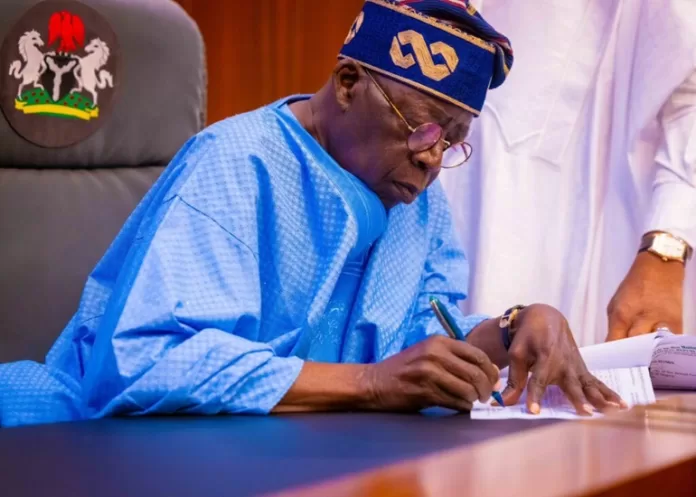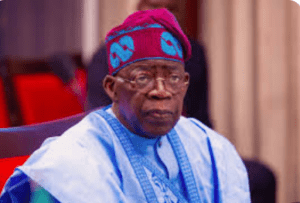President B
Ola Tinubu on Tuesday announced the establishment of the National Engineering and Innovation Fund (NEIF) to accelerate the provision of grants and resources to engineers and technologists working to solve Nigeria’s infrastructure challenges.
Speaking in Abuja at the opening ceremony of the 2024 Engineering Conference and Annual General Meeting of the Nigerian Society of Engineers (NSE), the president stated that the fund aims to support local innovations and ensure that Nigeria remains at the forefront of engineering advancement in Africa.
The event, which was themed: “Sustainable Engineering Solutions to Food Security and Climate Change,” he said, could not be more relevant, given that engineering sits at the heart of progress in today’s world.
Besides, the president, who was represented by the Minister of State for Works, Bello Goronyo, noted that through partnership with educational institutions and private sector stakeholders, the federal government was working to enhance technical training to improve engineering curriculum, and provide hands-on experience.
“We are also committed to supporting Nigerian engineers by creating an environment that fosters innovation. I am proud to announce the establishment of the National Engineering and Innovation Fund (NEIF).
“This is a new initiative designed to provide grants and resources to engineers and technologists working on solutions for Nigeria’s unique challenges.
“With this fund, we aim to support local innovations, encourage entrepreneurship, and ensure that Nigeria remains at the forefront of engineering advancement in Africa as well as strengthening regulations and standards,” Tinubu said.
The president said his administration recognises the importance of upholding and enforcing stringent standards across all engineering projects, promising to work closely with the NSE and other regulatory bodies to ensure that only licensed, qualified professionals are entrusted with critical national projects.
READ ALSO: President Tinubu Seeks Senates Approval for $2.2bn External Loan
Describing engineers as not only builders but also problem solvers, creators, and the architects of the future, President Tinubu emphasized that Nigeria is fortunate to have some of the finest engineers. He stressed that one of the foremost priorities of his administration is to build and maintain resilient infrastructure that meets the demands of the growing population and dynamic economy.
“We cannot achieve our vision for Nigeria without roads that connect communities, bridges that stand the test of time, and facilities that support industries,” he stated.
He added that the government is committed to significantly increasing investment in infrastructure projects, not just in urban centers, but also in rural communities often overlooked. “But infrastructure is the only piece of the puzzle for our mission to thrive,” he explained.
The president highlighted the need for a robust industrial sector that competes globally. He said, “We are implementing policies that encourage industrialisation, support local manufacturing, and create opportunities for engineers to innovate and thrive, while promoting sustainable energy solutions.”
He further pointed out that energy remains the backbone of any economy, underscoring the government’s ambitious plans to expand the energy grid, invest in renewable energy sources, and reduce Nigeria’s dependency on fossil fuels. “We aim to build a resilient energy sector that not only powers homes and industries but also protects our environment for future generations,” he added.
In his keynote address, the Minister of Agriculture and Food Security, Senator Abubakar Kyari, affirmed that Tinubu has made it clear that food security is a key priority of his administration, evident through the support given to the agricultural sector. He noted that climate change has impacted nearly every aspect of life, particularly agriculture, which has been the worst hit.
“With agriculture playing a significant role in Nigeria’s economy, contributing 30 percent of Nigeria’s GDP as of the first quarter of 2024, and with a growth of 0.18 percent, the sector remains crucial for providing livelihoods to many Nigerians, especially in rural areas,” Kyari said. He further pointed out that Nigeria has over 84 million hectares of arable land, but only about 1.6 million hectares are irrigated, leaving much of the land reliant on unpredictable rainfall.
Kyari also identified the poor road networks in rural areas, which account for 70 percent of Nigeria’s agriculture, as a major barrier to transporting produce from farms to markets. This issue raises costs and reduces accessibility for consumers.
Borno State Governor, Prof. Babagana Zulum, also addressed the gathering, urging the Nigerian Society of Engineers (NSE) and members of the engineering community to invest in research in areas such as irrigation, food cultivation, water harvesting, mechanization, and environmental degradation to boost food production.
In her remarks, the President of the NSE, Margaret Oguntala, stated that the NSE is leading the charge in promoting renewable energy by partnering with key stakeholders to integrate solar, wind, and bioenergy solutions across various industries. Through strategic collaboration with the National Agricultural Land Development Authority (NALDA), Oguntala revealed that the NSE has established demonstration farms in all six geopolitical zones.
Oguntala, the first NSE president in over 66 years, also noted that the society has mobilized both public and private partnerships to implement eco-friendly initiatives and build capacity in green technologies, aligning with global best practices. She explained that food insecurity, exacerbated by climate change, continues to be a critical issue, as it disrupts agricultural productivity and threatens livelihoods.


